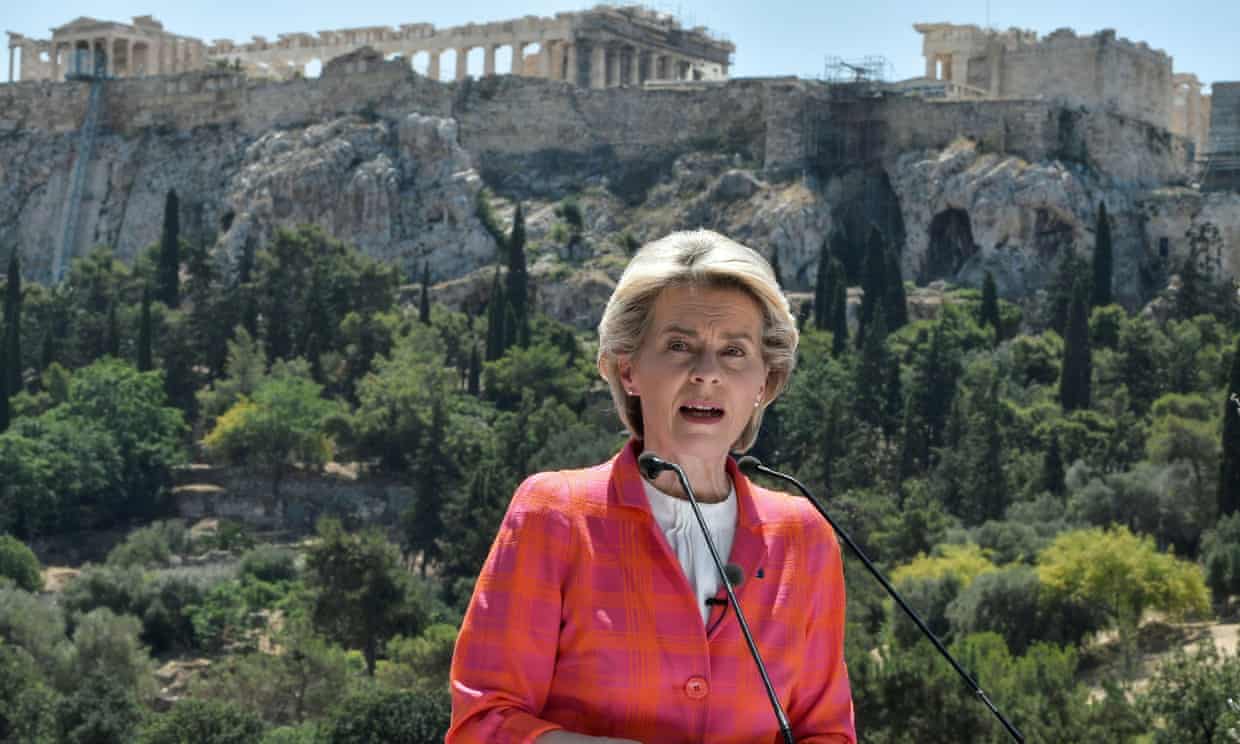Lack of citizens at EU’s citizens’ debate raises eyebrows
THE. GUARDIAN – Analysis: legitimacy of Future of Europe talks called into question as only a quarter of citizens likely to take part
Analysis: legitimacy of Future of Europe talks called into question as only a quarter of citizens likely to take part

The socially distanced places are set, the guests will soon arrive. Everything is ready for the EU’s most ambitious attempt to debate with citizens. Everything, except most of the citizens who are meant to be involved.
The Conference on the Future of Europe, an 11-month consultation whose centrepiece will be citizens’ assemblies across the EU, holds its first working session at the European parliament in Strasbourg on Saturday. While a full complement of EU politicians and officials are expected in the Rhine city, only about 27 citizens are likely to take part – a quarter of the total who would usually participate in such meetings, according to the conference website.
That might seem odd for a project billed by European Commission president, Ursula von der Leyen, as one where citizens “play a leading and active part in building the future of our union”. An EU official insisted, however, that everything was going to plan. “There is no delay: the European citizens’ panels will start meeting as of September or October, and we are on time for this.” Although the project has been under discussion for more than three years, the selection of citizens’ panels – representative groups of people from all corners of the EU – is incomplete.
Guy Verhofstadt, the veteran EU politician and a co-chair of the conference, dismissed suggestions that the absence of many citizens at the start undermines the legitimacy of the project. “The decisions will not be taken in June. The decisions will be taken in March, in February [2022] when the conclusions will be taken,” he said this week. “What you are saying is that the whole purpose of this conference is to liaise with citizens. Not at all. The purpose of this conference is to elaborate a vision, a new vision of the future of Europe … and we want to do that based on the input of citizens.” Meanwhile, organisers expected 67 EU citizens to take part in an event in Portugal on Thursday.
Verhofstadt, an ardent federalist, is seen by some EU governments as one of the problems of the troubled project, which has been marred by inter-institutional EU turf wars, since first adopted by Von der Leyen, as she battled to get MEPs to vote her in as commission president. The idea was first floated by Emmanuel Macron in March 2019, as the French president sought to draw lessons from Brexit. It is no accident that the conference will end during the first phases of the French presidential elections in spring 2022.
After the onset of coronavirus, many governments see the project as an unwelcome distraction. EU ministers successfully diluted Verhofstadt’s role: the Belgian is one of three co-chairs on an executive board, part of the conference’s elaborate structure.
The top-heavy bureaucratic structure, plus a founding declaration replete with jargon, such as “subsidiarity” and “stakeholders”, have not inspired some observers. The historian Timothy Garton Ash described the conference as “an orgy of introspection”. Even sympathetic observers fear the project lacks clear goals and could boost Eurosceptics, if there are no tangible benefits.
Others argue it is too soon to write off the democratic experiment. The political scientist Alberto Alemanno was one of the project’s fiercest critics, but has been won round by the final plans.
“This might be the first time the EU institutions and the member states have created an institutional mechanism they might end up not being in control of”
he said, citing the potential for citizens’ assemblies to interpret the task in their own way. The EU law professor thinks the focus on issues (global heating, jobs and health, for example) rather than the arcane business of EU treaty change, shows leaders have learnt lessons from the 2002-03 Convention on the Future of Europe that resulted in the ill-fated European constitution, rejected by French and Dutch voters in 2005.
The pan-European citizens’ assemblies – which would involve 800 people in locations yet to be decided – were a first for the EU, he added. “This conference carries the potential to act as a Trojan horse, both for new ideas and dynamics within the union. In the absence of member states’ control, some of these ideas and dynamics may actually stick.”
Damian Boeselager, the first and only MEP for Volt, a pan-European movement that wants greater public involvement in politics, is also enthusiastic. “A debate about the future of Europe itself has value and needs to be had,” he said. The benchmarks for success should be the project’s reach and whether it results in “concrete changes” to how the EU works. “It’s not a good result if this is a consultation process that ends up with a report for the European council [of EU leaders], then they discuss it for two minutes and it’s done,” he said. But first the EU needs to find some citizens.